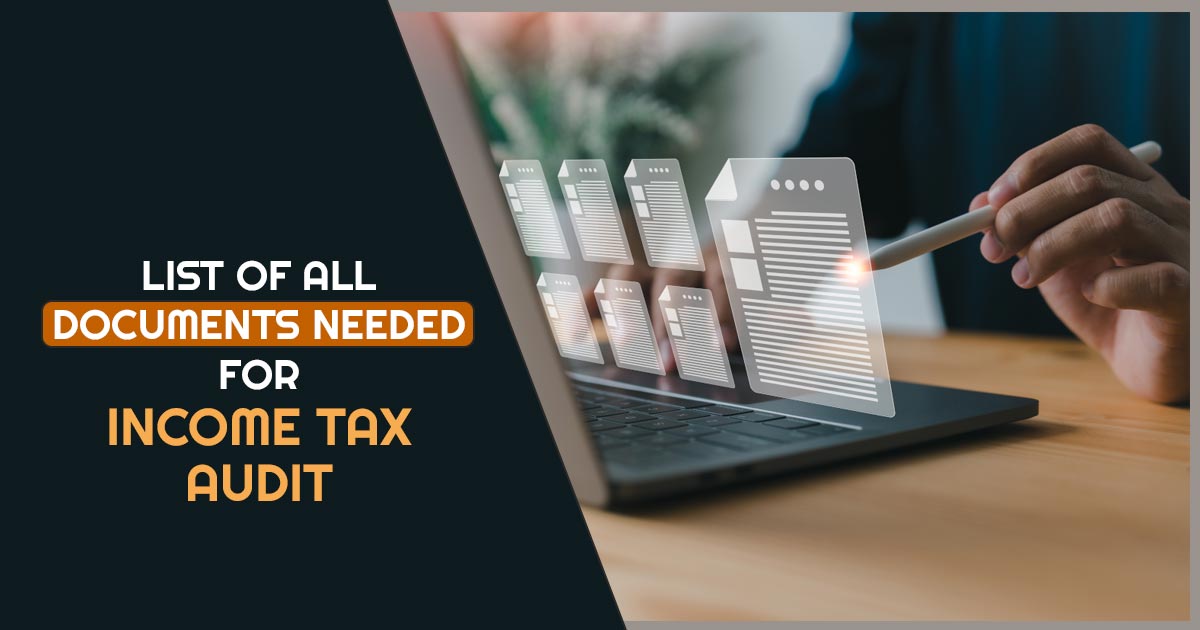
This post will simplify the list of all important documents that are required for an income tax audit. To comply with income tax audit requirements, individuals earning income from their businesses or professions must keep various records. These records encompass items such as accounting books, cash registers, ledgers, and journals.
Moreover, it is essential to maintain these records in a designated format and by established principles.
The government imposes income tax audits on high-earning businesspersons and professionals as a means to guarantee precise reporting, deter tax evasion, and uphold equity in revenue collection. Audits also serve to review intricate financial transactions and promote overall tax adherence.
Important Documents Required for I-T Audits
The roster of documents needed for income tax audits is consistent across all individuals subject to such audits. Nevertheless, specific professions like legal, engineering, and medical demand additional document retention on top of the standard list detailed below.
A tax and business consulting group, some crucial documents that individuals must maintain for income tax audits include the following. A comprehensive set of documents is necessary for income tax audit purposes, which should include the following:
- A cash book meticulously records all daily cash receipts and expenditures, along with the closing cash balance at the end of a designated period, not exceeding one month.
- A ledger diligently tracks all debit and credit transactions.
- A journal book, specifically when following the mercantile system of accounting.
- Original invoices were sent to the individual, and receipts for expenses incurred by the individual. However, if no bills or receipts are issued, and the expenses incurred do not exceed Rs 50, the taxpayer is only obligated to maintain signed payment vouchers.
- Duplicate copies of bills issued by the individual, whether machine-numbered or sequentially numbered, as well as duplicate copies or counterfoils of receipts issued by the individual, provided these bills or receipts amount to Rs 25,000 or more.
It’s important to highlight that the necessity to create and validate payment vouchers does not apply if the person’s cash book adequately details the expenses incurred. Additionally, all taxpayers undergoing an income tax audit must uphold their financial records, including the trial balance, profit and loss statement for the fiscal year, and balance sheet, among others.
Tax Presumptive Scheme Under Section 44AD & 44ADA
If the taxpayer chooses presumptive taxation, whether for their business or profession and meets the conditions outlined in Section 44AD or Section 44ADA, there’s no obligation to keep accounting books or subject them to an audit. However, should the taxpayer assert that their business or professional earnings are lower than the prescribed presumptive taxation rates, they must maintain accounting books and have them audited.
The medical professional is required to keep the following things in addition to the aforesaid-
- Case register in Form No. 3C daily
- Inventories for the first and last days of the former year
To compile the necessary documents for an income tax audit, an individual must also maintain specific sets of accounting records. Without maintaining the complete set of accounting records, it is not possible to have the documents required specifically for an income tax audit.
Fortunately, there are several accounting software options available in the market that can simplify the task of managing this extensive list of documents. All that’s needed is a basic ledger to input debit and credit entries into the software, and it will automatically generate the necessary accounting records from that data.
Documents and Forms that an Auditor Must Prepare
For individuals who are obligated to undergo audits under laws other than income tax regulations, the prescribed audit report form is Form 3CA, and the required details are to be provided in Form 3CD. In other cases, where the tax audit report is necessary, Form 3CB, along with Form 3CD, is the prescribed format.
- I-T Audit Form 3CA: If a company is already obligated to have its financial records audited under another law, such as the Companies Act of 2013, its audit report will take Form 3CA.
- I-T Audit Form 3CD: This is a standard form applicable to individuals or entities undergoing audits to comply with various laws, such as the Income Tax Act, Companies Act, and more.
- I-T Audit Form 3CB: For individuals who require an audit solely for income tax purposes, Form 3CB is the appropriate choice.
It’s important to note that the list provided is not exhaustive, as there are other forms that a tax auditor may need to use depending on the specific laws applicable to a particular taxpayer.








